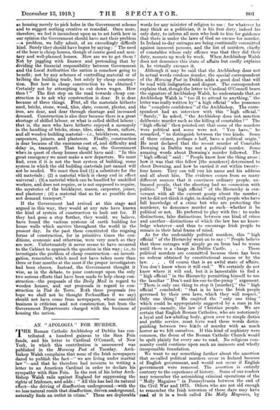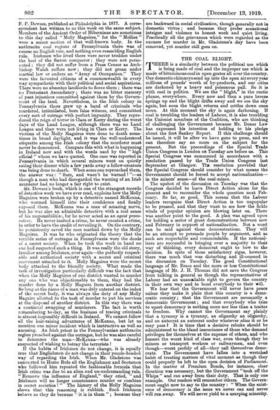AN " APOLOGIA " FOR MURDER. T HE Roman Catholic Archbishop
of Dublin has contributed a hundred guineas to the Sinn Fein funds, and his letter to Cardinal O'Connell, of New York, in which this contribution is announced was published in the Morning Post of Tuesday. Archbishop Walsh complains that none of the Irish newspapers dared to publish the fact—" we are living under martial law "—and that he therefore had recourse to writing a letter to an American Cardinal in order to declare his sympathy with Sinn Fein. In the rest of his letter Archbishop Walsh. rails against England for suppressing the rights of Irishmen, and adds : " All this has had its natural effect—the driving of disaffection underground—with the no less natural result that disaffection, drivenunderground, naturally finds an outlet in crime." These are deplorable words for any minister of religion to use ; for whatever he may think as a politician, it is his first duty, indeed his only duty, to inform all men who look to him for guidance that there is under the laws of God no excuse for murder. In Ireland to-day, outrages are being continually committed against innocent persons, and the list of murders, chiefly of constables whose only offence was that they did their duty, mounts up week by week. When Archbishop Walsh does not denounce this state of affairs but coolly explains it, he virtually excuses it. Although it may be said that the Archbishop does not in actual words condone Murder, the special correspondent of the Morning Post in Dublin adds a good deal that will be read with indignation and disgust. The correspondent explains that, though the letter to Cardinal O'Connell bears the signature of Archbishop Walsh, he understands that, as Archbishop Walsh is " too ill to attend to anything," the letter was really written by " a high official " who possesses the "complete confidence" of the Archbishop. The correspondent had an interview with this " high official." " Surely," he asked, " the Archbishop does not sanction deliberate murder such as the killing of constables ? " The " high official" then pointed out that some of the murders were political and some were not. " You have," he remarked, " to distinguish between the two kinds. Some of these crimes, perhaps a half, have a political origin." He next declared that the recent murder of Constable Downing in Dublin was not a political murder. Some amazing words about Downing's murder followed. The " high official " said : " People know how the thing arose ; how it was that this fellow [the murderer] determined to shoot Downing, and how he carried it out within twentyfour hours. They can tell you his name and his address and all about him. The evidence comes from so many different sources that it convinces ordinary people, unbiassed people, that the shooting had no connexion with politics." This " high official " of the Hierarchy is conversant with all the current gossip about the murder ; yet he did not think it right, in dealing with people who have full knowledge of a crime but who are protecting the murderer, to denounce murder as such—whether it be political or not. He preferred to play with fire : to make distinctions, false distinctions, between one kind of crime and another—distinctions of which the law has no knowledge whatever—and thus to encourage Irish people to remain in their fatal frame of mind.
As for the undeniably political murders, this " high official " of the Hierarchy went on to say : " People believe that these outrages will simply go on from bad to worse until there is a change in Dublin Castle. . . . These political murders are committed because there has been no redress obtained by constitutional means or by the law. . . . Of course that is an awful state of affairs. You don't know where it will end." We certainly do not know where it will end, but it is lamentable to find a " high official " in the Hierarchy permitting himself to use the familiar " Don't-nail-his-ear-to-the-pump " argument. " There is only one thing to stop it [murder]," the " high official " concluded; " that is to have the Irish people governed by their own laws, which they will respect." Only one thing ! He oinitted the " only one thing " which could be appropriately suggested by a man in his position—namely, the law of Christian people. We are certain that English Roman Catholics, who are notoriously a loyal and law-abiding body, given over to simple duties and public service, must have read these words distinguishing between two kinds of murder with as much horror as we felt ourselves. If this kind of sophistry were common, the doom of the Roman Catholic Church would be spelt plainly for every one to read. No religious community could continue upon such an insincere and wholly irresponsible foundation. We want to say something further about the assertion that so-called political murders occur in Ireland because of English government, and would not occur if English government were removed. The assertion is entirely contrary to the experience of history. Some of our readers may remember the astonishing criminal operations of the " Molly Maguires " in Pennsylvania between the end of the Civil War and 1875. Others who are not old enough to remember the Irish terrorism of those ,days may have read of it in a book called The Molly Maguires, by F. P. Dewees, published. at Philadelphia in 1877. A correspondent has written to us this week on the same subject. Members of the Ancient Order of Hibernians are sometimes to this day called " Molly Maguires," for the " Mollies " were a secret section of that well-known body. In the anthracite coal regions of Pennsylvania there was of course no English rule, and nothing even resembling English rule. Irishmen who lived there were never trodden under the heel of the Saxon conqueror ; they were not persecuted ; they did not suffer from a Press Censor as Archbishop Walsh suffers now • they did not groan under martial law or endure an Army of Occupation." They were the favoured citizens of a commonwealth in every way sympathetic with their political and social aspirations. There were no absentee landlords to fleece them ; there was no Protestant Ascendancy • there was no bitter memory of past injustices committed against them •by the Government of the land. Nevertheless, in the Irish colony in Pennsylvania there grew up a band of criminals who murdered, intimidated, bore false witness, and committed every sort of outrage with perfect impunity. They reproduced. the reign of terror in Clare or Kerry during the worst days of the Land League, although there was no Land League and they were not living in Clare or Kerry. The victims of the Molly Maguires were done to death sometimes in broad. daylight, and it was the well-understood etiquette among the Irish colony that the murderer must never be denounced. Compare this with what is happening in Ireland now and with the words used by the high official " whom we have quoted. One case was reported in Pennsylvania in which several miners went on quietly eating their dinner while, a few yards away a fellow-creature was being done to death. When some one reproached them, the answer was : " Sure, and wasn't he warned ! "—as though a man who had disregarded the warning of an Irish murderer had no longer a fair right to exist. Mr. Dewees's book, which is one of the strangest records of detective work we have ever read, explains how the Molly Maguires were broken up by a detective named McKenna, who wormed. himself into their confidence and finally exposed them. McKenna was a man of amazing nerve, but he was also an admirable detective with a real sense of his responsibilities, for he never acted as an agent provocateur. He never incited a crime, he never created. a crime, in order to have the credit of revealing it. On the contrary, he persistently saved the men marked down by the Molly Maguires. It was he who originated the theory that the terrible series of outrages in Pennsylvania were the deeds of a secret society. When he took the work in hand no one had suspected such a thing. It was really the old story, familiar among Irishmen, over again—the perfectly respectable and authorized society with a secret and criminal movement attached to it. Molly Maguires were the secret body attached to the friendly society. What made the task of investigation particularly difficult was the fact that when the Molly Maguires of one district wanted to murder any one who was objectionable to them, they had the murder done by a Molly Maguire from another district. So long as the name of a man was duly entered on the index of the secret body, it was always the duty of any Molly Maguire allotted to the task of murder to put his services at the disposal of another district. In this way there was a continual swapping of murderers. The fact is worth remembering to-day, as the business of tracing criminals is almost impossibly difficult in Ireland. We cannot follow all the hair-raising adventures of McKenna, but let us mention one minor incident which is instructive as well ■as amusing. An Irish priest in the Pennsylvanian anthracite region preached against the outrages, but he was.also careful to denounce the man—McKenna—who was already suspected of wishing to betray tie terrorists I If the habits of Irishmen do not change, it is equally true that Englishmen do not change in their puzzle-headed way of regarding the Irish. When Mr. Gladstone was cone rted to Home Rule all the Englishmen and Scotsmen who followed him repeated the fashionable formula that Irish crime was due to an alien and un-understanding rule. " Remove the influence of England," they cried, " and Irishmen will no longer countenance murder or combine in secret societies ! " The history of the Mollyes shows that this reasoning is rubbish. Such =en behave as they do because " it is in them " ; because they are backward in social civilization, though generally not in domestic virtue ; and because they prefer sensational intrigue and violence to honest work and quiet living. Practically all the grievances which were regarded as the excuses for murder in Mr. Glaclstone's day have been removed, yet murder still goes on.



















































 Previous page
Previous page